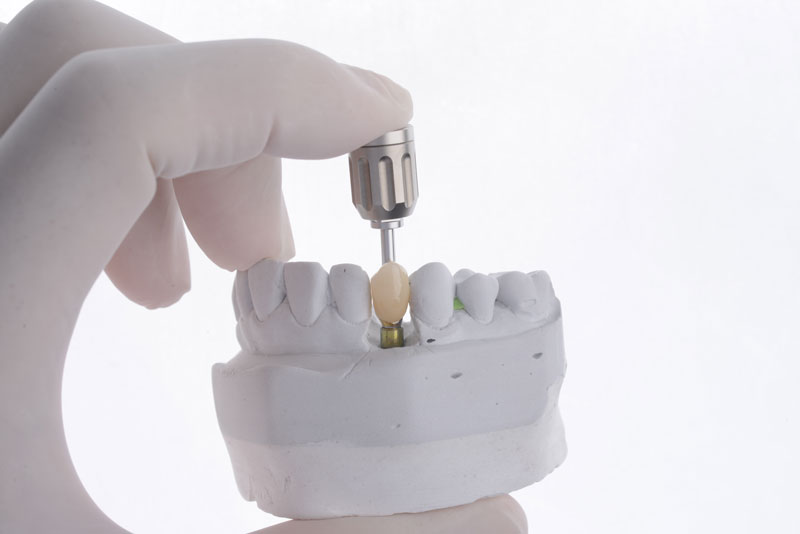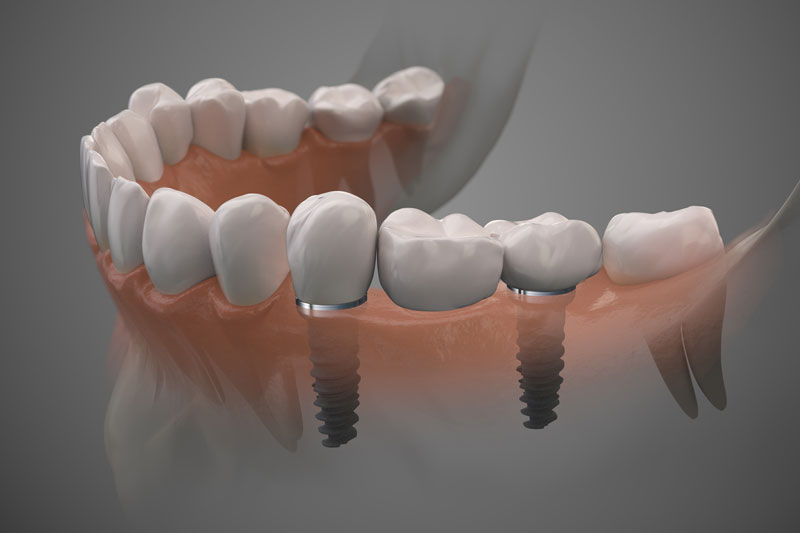
What Is Dental Implant Failure?
A dental implant may be considered unsuccessful if it doesn’t integrate properly with the bone or if problems arise later on.
There are two main types:
- Early failure – when the implant doesn’t heal or bond with the bone as expected.
- Late failure – when issues develop months or years later due to infection, bone loss, or pressure.
If this happens, your dentist will carefully assess the situation and recommend the most suitable next steps.

What Can Cause Dental Implant Failure?
Most implants heal well, but there are factors that can increase the likelihood of complications. Knowing these can help reduce risks and support long-term oral health.
Common causes include:
Oral hygiene challenges
plaque and bacteria can affect gum and bone health.
Gum disease
ongoing inflammation can weaken tissue around the implant.
Smoking or tobacco use
reduces blood flow and slows healing.
Medical conditions
such as diabetes or osteoporosis, which can impact recovery.
Bone Loss
insufficient jawbone density can reduce implant stability.
Bruxism (teeth grinding)
excess pressure can strain the implant.
Peri-Implantitis
a bacterial infection around the implant.
Medication side effects
some medications may influence bone healing.
What Are Signs a Dental Implant May Be Failing?
It’s always best to get checked early to prevent further complications. Contact your dentist if you notice:
- Redness, swelling or tenderness around the implant
- Looseness or movement of the implant or crown
- Bleeding when brushing
- Discomfort when chewing
- Gum recession near the implant site

Understanding Peri-Implantitis
Peri-implantitis is one of the most common causes of late implant failure. Regular dental check-ups and proper daily cleaning play an important role in prevention.
It occurs when bacteria build up around the implant, leading to inflammation and bone loss:
Possible symptoms include:
- Bleeding when brushing
- Swelling or sensitivity near the implant
- Gum recession or exposed implant threads
Treatment options may include:
- Professional cleaning and antimicrobial therapy
- Local surgery to restore gum or bone tissue (if suitable)
- Ongoing maintenance appointments
How We Manage Failed Implants
At FoX, every treatment plan is personalised and based on your clinical needs.
If an implant fails, your dental professional will:
- Assess the implant and surrounding bone using scans or X-rays.
- Determine the cause, whether it’s infection, bone loss or bite pressure.
- Recommend appropriate treatment, which may include:
- Cleaning or decontaminating the site
- Bone grafting to restore density
- Replacing the implant once healing occurs
Caring for Your Implants to Reduce Risk
A few small habits can make a big difference in maintaining implant health:
- Daily care – Brush and floss as directed to control plaque around the implant.
- Routine check-ups – Regular professional cleanings help detect issues early.
- Quit smoking – Tobacco use can interfere with healing and implant health.
- Protect against grinding – A custom night guard can reduce pressure on implants.
- Follow aftercare advice – Adhering to post-surgery guidelines supports proper healing.
Our Policy of Supportive Care
Your dental treatment matters deeply to us. We provide comprehensive support through our implant policy if you experience any complications.
We dedicate ourselves to your ongoing care throughout every stage of your journey.
- We guarantee titanium implant components with a lifetime material warranty.
- We warranty acrylic components for one year.
Regular reviews and participation in the FoX Smile Care Program help maintain implant health over time.


Get the Best Care for Your Dental Implants at FoX
The right care makes all the difference in the lifespan of your dental implants. FoX Implant Centre offers advanced dental implant placement with precision, experience and state-of-the-art technology.
The right care makes all the difference. At FoX Implant Centre, we combine precision, experience and advanced technology to protect your investment in dental implants.
Book a consultation at our Melbourne, Brisbane or Adelaide clinic, and we’ll:
- Examine your implant and surrounding tissues
- Explain possible causes and next steps
- Develop a treatment or maintenance plan suited to your needs
FAQ
The most common reason for dental implant failure is an issue called peri-implantitis. This refers to an inflammation of the tissue around the implant that’s caused by bacteria. Other factors can include insufficient bone support, uncontrolled medical conditions (such as diabetes), smoking or excessive force on the implant during healing.
Careful assessment and ongoing oral hygiene are important to reduce the risks of implant failure.
Signs that a dental implant might have healing problems can include:
- Persistent discomfort or swelling around the implant site
- Movement or looseness of the implant
- Receding gums or visible gaps near the implant
- Difficulty chewing
If you notice any of these symptoms, it’s important to contact your dental professional promptly for assessment.
In many cases, yes. If an implant fails, your dental professional can often remove it, allow the area to heal and place a new implant once the bone and gum tissues have recovered.
The approach depends on your oral health, bone quality and any contributing factors that led to the initial failure. Your clinician will explain what’s possible based on your individual situation.
With regular check-ups, good oral hygiene and healthy lifestyle habits, full mouth dental implants can last for many years. However, their longevity can vary between individuals depending on factors such as bone health, gum condition and general health. Routine professional reviews help ensure the implant and surrounding tissues remain stable over time.
Some people may feel discomfort, swelling or tenderness if an implant fails or if the surrounding tissues become inflamed. Others may not feel pain at all but may notice looseness or changes around the implant site. If you experience any of these symptoms, it’s best to have the area examined by your dental professional as soon as possible.
Implant failure can occur at different stages depending on individual healing and circumstances.
- Early implant issues typically arise within the first four months during bone integration, affecting both standard and emergency implants placed immediately after extraction.
- Late implant issues may develop a year or more after placement, often linked to bone density changes, infection or bite pressure variations.
New Teeth in One Day
Funded by your Super
Request A Free Consultation

Get implant pricing and financing options,
Including your superfund!
Find Out If You're A Candidate!






